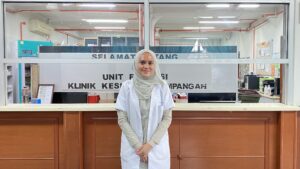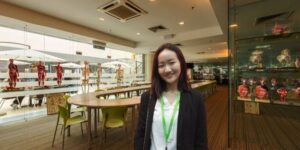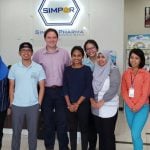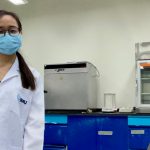Learning does not stop after undergraduate studies. Gaining a Masters would expand and build upon the knowledge and skills that you have developed at Bachelors level. This is the aim of the IMU Master of Science in Analytical and Pharmaceutical Chemistry (MAPC) programme, which is a mixed mode Masters consisting of 21 credits of coursework and 22 credits of research project. Students may study full-time, or part-time to fit with their other commitments. ‘Within a year of my working life, although I learned various analytical techniques and pharmaceutical related knowledge, deep down I was starting to feel that I wanted to learn more from what I was capable of’, shares MAPC student, Eddy Yii Chung Ann (in the photo above), who is an Analytical Research and Development executive at Oncogen Pharma Malaysia Sdn Bhd. ‘Besides the research skills, the most unforgettable knowledge I had learnt during this programme was during the quality management and regulatory management module, as this module was entirely taught by the guest lecturers who have prior experiences in various pharmaceutical industries’. ‘Moreover, I was also re-introduced with many guidelines and standards in drug testing regulations. The MAPC programme allows me to learn all these through the various modules and lab practical sessions. Most of them are totally relatable and competent to what we always practice at pharmaceutical labs.’
For Nur Najihah Binti Salahuddin, a pharmacist at Klinik Kesihatan Ampangan and MAPC student, the availability of the Open and Distance Learning (ODL) delivery mode was an added advantage.
‘I think this ODL mode saves my life; although both public and private universities offered master’s programmes, the time was not flexible enough for me to juggle my studies and job.”
‘The easy access to lectures notes, discussion, and assignment submissions allow me to have flexible time to study. Even though the ODL mode is an excellent alternative learning mode for working students, I also struggle with time commitment between work and assignment workloads. This proves that postgraduate courses are more autonomous, requiring students to put more personal effort into the learning process and engage independently. These somehow help me to enhance my time management skills, professional skills, and self-motivation’. Students in the programme develop specialised skills in their chosen research area under the guidance of experienced faculty.
‘Frankly speaking, I was dumbfounded by how my supervisors could supervise me in combining my skills and interests to create something great which could be really beneficial to anyone out there in the future’, shares MAPC student, Wong Yoke Lan (Kath), who has recently successfully defended her dissertation. ‘Although it was not an easy feat, I am pleased that I am able to complete my Master’s study in less than two years. I am grateful for the constant support and patience from my supervisors, my family, friends, and most importantly myself. For anyone who is considering Master’s study, find your passion, believe in yourself, and go for it. It doesn’t matter if you still have yet gotten your life all figured out, just make sure to discover yourself along the path you’ve chosen’. The duration for the MAPC programme is one year for full-time study, and up to 6 years for part-time study. Teaching and learning activities are conducted over the weekends, and the programme is available in both Open and Distance Learning (ODL), and Conventional delivery modes. The programme is accredited by MQA and internationally accredited by the Royal Society of Chemistry, UK.
| Read their full stories: | |
|---|---|
| Eddy Yii Chung Ann | The Right Choice for Me: Pursuing an IMU MSc in Analytical and Pharmaceutical Chemistry While Working Full-time |
| Nur Najihah Binti Salahuddin | A Fulfilling Healthcare Career while Pursuing Postgraduate Studies Amid a Covid-19 Pandemic |
| Wong Yoke Lan (Kath) | My Journey as an IMU MSc in Analytical and Pharmaceutical Chemistry Student |











